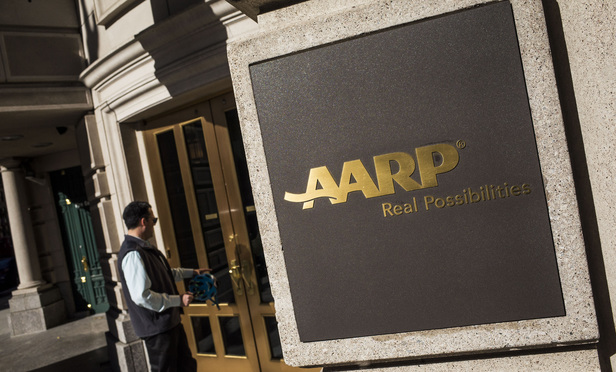Hiring, Not Firing, Is a New Focus in Age Discrimination Suits
Management tactics that weed out older workers have pushed federal regulators and anti-discrimination groups to train an eye on hiring…
June 29, 2017 at 11:23 AM
6 minute read
The original version of this story was published on National Law Journal
Management tactics that weed out older workers have pushed federal regulators and anti-discrimination groups to train an eye on hiring rather than firing when it comes to protecting against age bias, an effort advocates acknowledge is a steeper hill with increasingly narrowed protections for aging workers.
This shift in focus on barriers to hiring for older workers—an issue exacerbated by the aging baby boomer population and the financial crisis—is apparent in recent court battles and was sparked by employer practices that include favoring young workers in online applications and excluding workers with too many years experience.

“Hiring discrimination has always been a problem,” said Laurie McCann, senior attorney at the AARP Foundation Litigation. “We can see a problem and then attack it, but most people don't know why they weren't hired. You don't have that comparison. Lately, we've been coming across these blatant policies and practices where it's obvious that older workers are screened out of an employer's hiring.”
This effort was dealt a blow this week when the U.S. Supreme Court declined to take up a case, Villarreal v. R.J. Reynolds Tobacco, from the U.S. Court of Appeals for the Eleventh Circuit. The appeals court said the Age Discrimination in Employment Act applies to people who already have jobs, not those seeking them. The ruling could narrow the reach of the 50-year-old federal age discrimination law and made it tougher for workers to prove that they were victims of bias in the hiring process.
The U.S. Equal Employment Opportunity Commission has said age discrimination applies to both employees and applicants.
One of the EEOC's strategic priorities is hiring-discrimination in the age context, said Cathy Ventrell-Monsees, senior adviser to the chair of the commission. She said online applications, recruiting tools targeting only recent college graduate and maximum years of experience have led to many problematic business practices.
She said the Supreme Court will likely wait for more of the cases to play out before taking up the dispute. Employers cannot put up “arbitrary barriers” to job applicants, she said.
“It's a straightforward legal issue and the courts are split on it,” she said. “It's inevitable the Supreme Court will eventually take it.”
Lawsuits mount against hiring practices
In in the recent case, Richard Villarreal, then 49 years old, applied for a job at R.J. Reynolds, which his attorneys claimed used a hiring practice—in reviewing applications—that tossed out 20,000 older applicants.
Villarreal sued in 2012 in the U.S. District Court for the Northern District of Georgia after a whistleblower came forward about the company's hiring guidelines and handed the documents over to the employee-side firm Altshuler Berzon in San Francisco. The Atlanta firm Rogers & Hardin was among the firms on the complaint with Altshuler Berzon.
The tobacco company, represented by a team from Jones Day, did not address the discrimination claims, but instead the right of the applicant to sue. Jones Day partner Eric Dreiband, who's being considered to run the U.S. Department of Justice's Civil Division, argued in the Eleventh Circuit for R.J. Reynolds.
McCann said she was disappointed the Supreme Court decided not to take the case but said the Eleventh Circuit ruling is not binding in other circuits. The AARP, she said, will continue to fight what she described as “intractable hiring discrimination that contributes to older workers' historical and persistent overrepresentation among the long-term unemployed.”
The AARP is working on similar cases that raise age-based hiring claims. The case Rabin v. PriceWaterhouseCoopers in the U.S. District Court for the Northern District of California challenges the accounting company's practice of recruiting college students online using a tool that can only be accessed by applicants with a college affiliation.
The group also is representing a worker in Kleber v. CareFusion Corporation before the U.S. Court of Appeals for the Seventh Circuit. In that case, 59-year-old Dale Kleber applied for a in-house counsel job that specified no more than seven years of experience at the Fortune 500 company.
CareFusion's lawyers said the post was an “entry-level position that would have less complex job duties” and be under the supervision of a higher-level attorney. “Although Kleber had more than 25 years of legal experience at the time, he chose to apply for the position,” Tobias Schlueter of Ogletree, Deakins, Nash, Smoak & Stewart wrote in CareFusion's brief on June 21.
McCann said the AARP would like to see the EEOC step into more cases. Last year, 20,800 age-discrimination complaints were filed with the agency.
The EEOC recently held the first in a series of meetings directly targeting questions about age discrimination in the workplace, training a new focus on the issue. Experts testified about how the workforce is growing and how practices have been in place, exacerbated by online applications, that hurt older workers.
Observers say the number of discrimination claims is expected to rise, with 10,000 baby boomers turning 65 every day, according to a 2010 Pew Research Center report. As of 2015, about 33 million Americans over age 55 were in the workforce, and that demographic is expected to make up a quarter of the entire U.S. labor force by 2019.
A 2009 Supreme Court case Gross v. FBL Financial Services said plaintiffs must demonstrate that a person's age is the motivating factor in being fired or demoted under the federal age discrimination law, a steeper standard than other discrimination cases.
Since the 2008 financial crisis, there has been an uptick in age-discrimination claims, said David Yeremian, a Los Angeles employment lawyer at Yeremian Law. He said the economic downturn hit just as a large generation was close to the end of their traditional careers.
“When we are talking nationally, or under federal law, generally, you can say age discrimination cases are a little tougher than non-ADEA discrimination cases,” said Yeremian. “It's just more difficult to win an age discrimination case. That definitely sets it apart.”
Related Articles:
Erin Mulvaney, based in Washington, covers labor and employment. Contact her at [email protected]. On Twitter: @erinmulvaney
NOT FOR REPRINT
© 2025 ALM Global, LLC, All Rights Reserved. Request academic re-use from www.copyright.com. All other uses, submit a request to [email protected]. For more information visit Asset & Logo Licensing.
You Might Like
View All

Bankruptcy Filings Surged in First Half of 2024 Amid Uptick in Big Chapter 11 Cases
3 minute read

Living Life the 'Sid Kess Way': Renowned Tax Expert and Law Journal Columnist for More Than 50 Years Dies at 97
4 minute readTrending Stories
- 1Some Thoughts on What It Takes to Connect With Millennial Jurors
- 2Artificial Wisdom or Automated Folly? Practical Considerations for Arbitration Practitioners to Address the AI Conundrum
- 3The New Global M&A Kings All Have Something in Common
- 4Big Law Aims to Make DEI Less Divisive in Trump's Second Term
- 5Public Notices/Calendars
Who Got The Work
J. Brugh Lower of Gibbons has entered an appearance for industrial equipment supplier Devco Corporation in a pending trademark infringement lawsuit. The suit, accusing the defendant of selling knock-off Graco products, was filed Dec. 18 in New Jersey District Court by Rivkin Radler on behalf of Graco Inc. and Graco Minnesota. The case, assigned to U.S. District Judge Zahid N. Quraishi, is 3:24-cv-11294, Graco Inc. et al v. Devco Corporation.
Who Got The Work
Rebecca Maller-Stein and Kent A. Yalowitz of Arnold & Porter Kaye Scholer have entered their appearances for Hanaco Venture Capital and its executives, Lior Prosor and David Frankel, in a pending securities lawsuit. The action, filed on Dec. 24 in New York Southern District Court by Zell, Aron & Co. on behalf of Goldeneye Advisors, accuses the defendants of negligently and fraudulently managing the plaintiff's $1 million investment. The case, assigned to U.S. District Judge Vernon S. Broderick, is 1:24-cv-09918, Goldeneye Advisors, LLC v. Hanaco Venture Capital, Ltd. et al.
Who Got The Work
Attorneys from A&O Shearman has stepped in as defense counsel for Toronto-Dominion Bank and other defendants in a pending securities class action. The suit, filed Dec. 11 in New York Southern District Court by Bleichmar Fonti & Auld, accuses the defendants of concealing the bank's 'pervasive' deficiencies in regards to its compliance with the Bank Secrecy Act and the quality of its anti-money laundering controls. The case, assigned to U.S. District Judge Arun Subramanian, is 1:24-cv-09445, Gonzalez v. The Toronto-Dominion Bank et al.
Who Got The Work
Crown Castle International, a Pennsylvania company providing shared communications infrastructure, has turned to Luke D. Wolf of Gordon Rees Scully Mansukhani to fend off a pending breach-of-contract lawsuit. The court action, filed Nov. 25 in Michigan Eastern District Court by Hooper Hathaway PC on behalf of The Town Residences LLC, accuses Crown Castle of failing to transfer approximately $30,000 in utility payments from T-Mobile in breach of a roof-top lease and assignment agreement. The case, assigned to U.S. District Judge Susan K. Declercq, is 2:24-cv-13131, The Town Residences LLC v. T-Mobile US, Inc. et al.
Who Got The Work
Wilfred P. Coronato and Daniel M. Schwartz of McCarter & English have stepped in as defense counsel to Electrolux Home Products Inc. in a pending product liability lawsuit. The court action, filed Nov. 26 in New York Eastern District Court by Poulos Lopiccolo PC and Nagel Rice LLP on behalf of David Stern, alleges that the defendant's refrigerators’ drawers and shelving repeatedly break and fall apart within months after purchase. The case, assigned to U.S. District Judge Joan M. Azrack, is 2:24-cv-08204, Stern v. Electrolux Home Products, Inc.
Featured Firms
Law Offices of Gary Martin Hays & Associates, P.C.
(470) 294-1674
Law Offices of Mark E. Salomone
(857) 444-6468
Smith & Hassler
(713) 739-1250







